Featured image credit: MetroLink
Los Angeles is fortunate to be home to one of only three Japan-towns in the U.S. And with Japan an ocean away, many Angelenos will likely only experience a taste of Japanese culture through our city’s Little Tokyo district. Little Tokyo Los Angeles is a protected National Historic Landmark. In its open-air markets and malls, we’re treated to not just the cultural but the pop-cultural aspects of Japan. Little Tokyo also offers one of the most authentic experiences for exploring the unique culture of Japanese Americans. We’re confident one visit won’t be enough. But here are 16 ideas to help you plan your next visit of many to LA’s Little Tokyo.
Update – May 2024:
Alarmingly, Little Tokyo Los Angeles just made the National Trust for Historic Preservation’s list of the 11 most endangered historic places in the country. Efforts by the group Sustainable Little Tokyo to secure a historic designation for the area have so far been fruitless. What can you do? Visit the current Little Tokyo and its unique businesses. They need your patronage now more than ever!
Update – April 2024:
It seems that rents have been hiked on commercial spaces across Little Tokyo Los Angeles in the wake of last summer’s Little Tokyo/Arts District metro station addition. Many legacy businesses are struggling to meet the demands of these rent increases. Several have announced their departures. Some have even already left. But don’t let this dissuade you from visiting one of the last Japantowns in the United States. If anything, these original Little Tokyo businesses need your patronage more than ever. Shabu Shabu House has sadly already departed its Little Tokyo location, and is still looking for a new space.
Japanese Village Plaza: The Heart of Little Tokyo Los Angeles
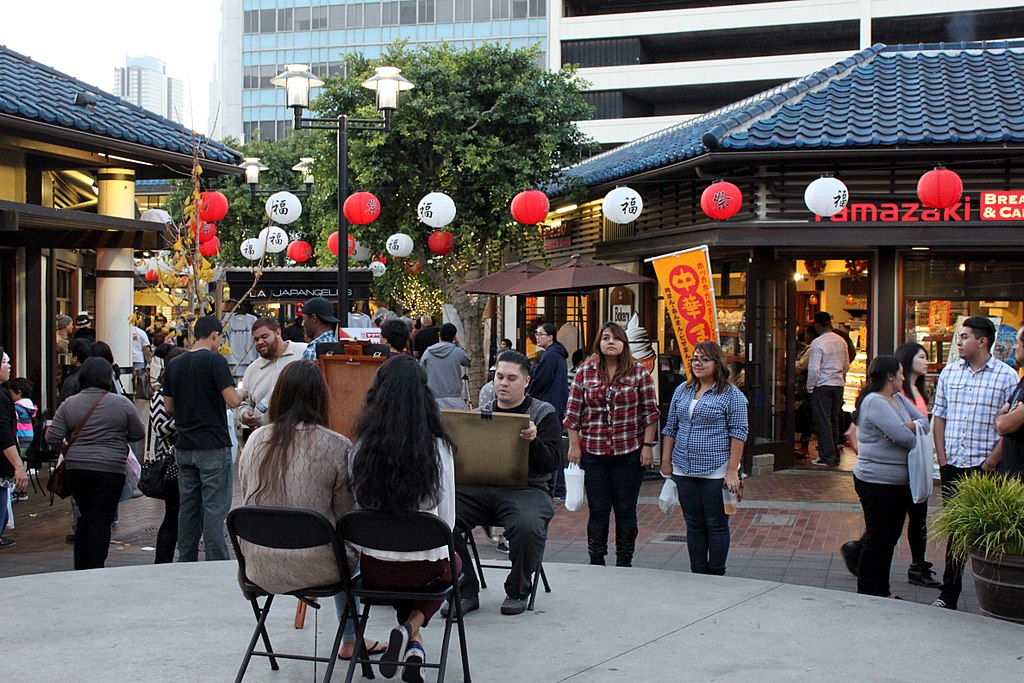
We hope you brought your wallet, because Little Tokyo Los Angeles offers a wealth of unique shopping options. Most of these are going to be found in the area known as Japanese Village Plaza. A sprawling outdoor Little Tokyo mall built in 1978, you could easily kill an afternoon just admiring its historic architecture. However, it’s hard to pull your eyes away from all of the dazzling shops. Luckily, Japanese Village Plaza also provides a variety of dining options to keep your motor running.
Tokyo Japanese Lifestyle: Life in LA by Way of Tokyo
Part of the beauty of visiting Little Tokyo Los Angeles is the chance to appreciate another culture. Tokyo Japanese Lifestyle presents outlet shopping with household items intrinsic to life in contemporary Japanese culture. Of course, modern Japanese life is steeped in tradition, so you’ll find a bit of the old artfully blended with the new here. Everything from chopsticks and tatami mats to Bento boxes and plush pop culture toys is represented. So if you’re a fan of the lifestyle or a Japanese expatriate craving familiarity, Tokyo Japanese Lifestyle can help!
Popkiller: Where Pop Culture Goes to Reincarnate on a T-Shirt
Popkiller, as the name implies, brings you the best in Japanese pop culture and trends. At Popkiller, you can find t-shirts emblazoned with your favorite anime characters or vintage finds to pull together that kawaii look. There are actually two Popkiller locations in Little Tokyo Los Angeles. One specializes in tees and can be found closer to the Arts District. The other, focusing on vintage novelties and gifts, is conveniently found in Japanese Village Plaza.
Nijiya Market: Trader Jyou’s
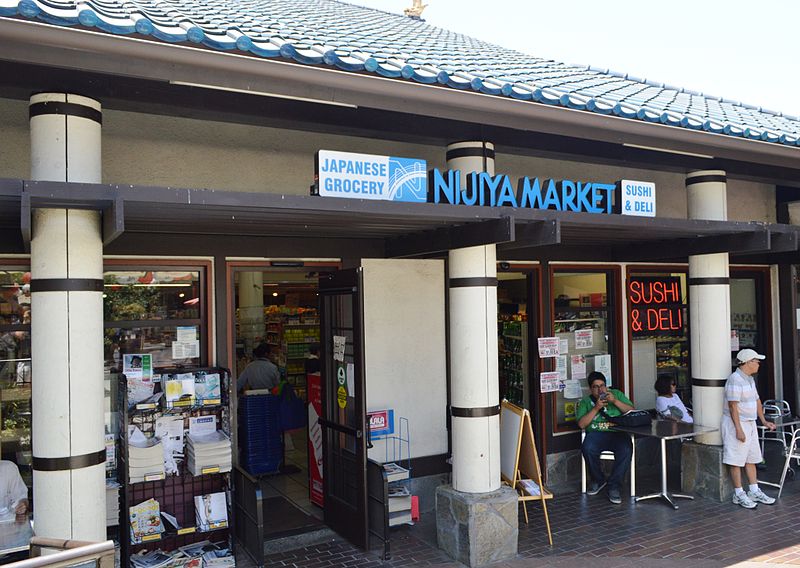
Learning to cook authentic Japanese cuisine? Then you’ll know how important it is to get the flavoring right. And your best bet for finding the right spice at the right price is Nijiya Market, also nestled in Japanese Village Plaza. This bountiful supermarket imports its exotic and gourmet goods directly from Japan. Needless to say, you’ll find ingredients at Nijiya Market you’re not likely to find anywhere else in LA.
Japanese American National Museum: Where Japan and America Meet
As one of only three Japan-towns in the country, Little Tokyo Los Angeles provides a rare opportunity to observe how Western and Eastern culture can blend together. Life as a Japanese American is unique. A great reverence for cultural tradition must be carefully balanced against contemporary life in the United States. It’s not always easy, but the results can be inspiring as documented by the Japanese American National Museum. With its exhibits honoring both historical artifacts and modern art, it’s the only museum in the country to focus specifically on the Japanese-American experience.
Japanese American Cultural and Community Center: Grounding Peace in Little Tokyo Los Angeles
Opening its doors in 1971, many guests have found tranquility and inspiration in the Japanese American Cultural and Community Center. This sanctuary offers a variety of spaces for community events, finding popular use as a venue for celebrating Japanese holidays. But within the building, you’ll also discover the James Irvine Japanese Garden. Sometimes referred to as “Seiryu-en” (Garden of the Clear Stream), it provides meditative solace amidst the hustle of life in LA. The community center is also home to the Aratani Theater which regularly hosts a variety of cultural and musical programs.
Go For Broke National Education Center: Beyond the Breaking Point
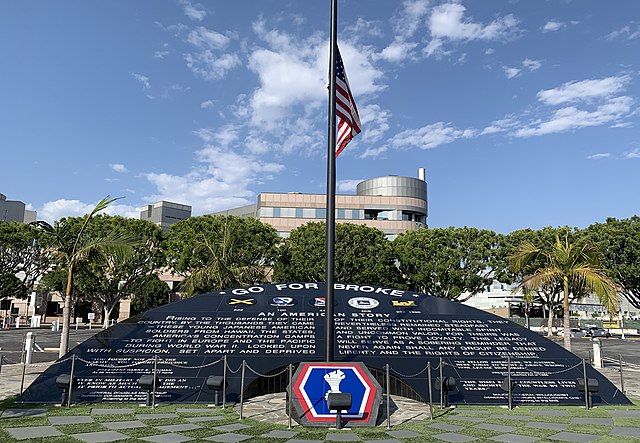
Sure, it may seem like a strange name for a war monument and education center. But “Go For Broke” was the motto of the 442nd Regimental Combat Team serving during World War II in Hawaii. And it’s that motto that dragged them through the fight against racial atrocities abroad and racial prejudice in their own neighborhoods. Sadly, it’s a fight that continues to this day. The Go For Broke Monument provides an opportunity to learn from the past and promise a better present (and future) for Japanese-Americans through gratitude for their many sacrifices.
MOCA Geffen: Everywhere is the Right Place for Modern Art
While the Japanese-American experience is central to what makes Little Tokyo Los Angeles so special, you’ll also regret missing the non-Japanese-centric MOCA Geffen. Part of the larger collection of MOCA facilities, the Geffen campus presents a 40,000 square foot space; the largest of the MOCA branches. It was at one time a warehouse, but legendary architect Frank Gehry renovated it into the ever-shifting canvas we enjoy today. Prepare for a multimedia smorgasbord of moving modern art to punctuate your Little Tokyo visit.
Lethal Amounts Gallery: An LA Staple Finds New Life in Little Tokyo
A new addition to the Little Tokyo Los Angeles community, the Lethal Amounts Gallery holds a strobing light up to the art coming from LA’s counterculture. With decidedly goth leanings, the events calendar at Lethal Amounts can be a lot of things. “Boring” isn’t one of them.
Sushi: Rolling Through the Options
At this point, you have to be getting pretty hungry. Good news: Little Tokyo Los Angeles offers a seemingly endless array of choices when it comes to authentic Japanese cuisine. Bad news: Little Tokyo Los Angeles offers a seemingly endless array of choices when it comes to authentic Japanese cuisine. Easily one of the most popular options is going to be sushi.
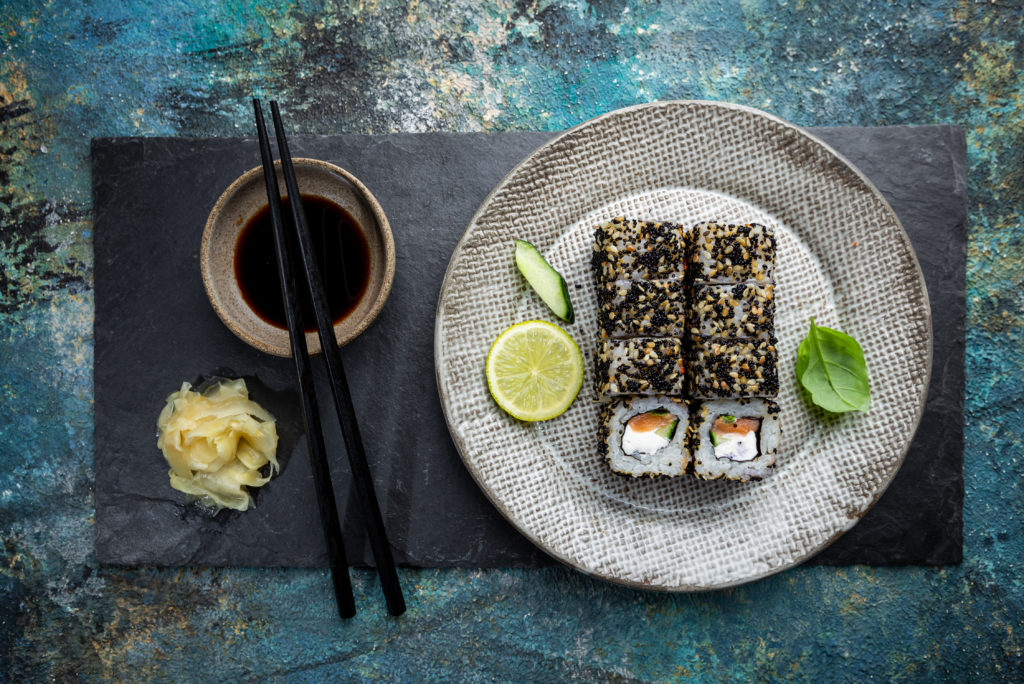
We already highlighted a few of our favorites in our Best Sushi Spots in Los Angeles blog. Those included Little Tokyo hot spots like Hama Sushi, Sushi Gen, and even a shout out to Sushi Enya Little Tokyo. But since this is literally a matter of taste, it’s hard to single out the best. There are just too many from which to choose! In a situation like this, there’s really only one thing to do: the Little Tokyo Sushi Crawl.
Shabu Shabu House: How Do You Do the Shabu That You Do?
What if we told you there’s life… or, at least, cuisine… beyond sushi? Mind Blowing concept, we know. But pull yourself away from that California roll for just a moment and consider a visit to one of the oldest restaurants in Little Tokyo: Shabu Shabu House. Japanese-Americans may recognize that “shabu shabu” translates to “swish swish.” It’s meant to reference the sound that emanates from a boiling pot of water once food is added. But this isn’t quite ramen (don’t worry; there’s plenty of that around too). Shabu shabu instead harkens back to a tradition of crafting a soup’s flavor as you go. Consider it culinary art in motion. At Shabu Shabu House, you can order vegetables and meat à la carte that you toss into the mix for a flavor of your own design. Sorry, Burger King, but this is really having it your way. When you add in the specialty house sauces, we have a feeling your first visit to Shabu Shabu House will be followed by many more.
Daikokuya: Next Level Ramen
Speaking of ramen, Daikokuya specializes in a very specific type of ramen known as “tonkotsu” (or pork bone). Lauded for its decidedly decadent, creamy consistency and its complex flavors, tonkotsu is obviously a favorite at Daikokuya. Yet, it’s not the only reason for the Little Tokyo restaurant’s popularity. Daikokuya also offers delicious delicacies you’re not likely to find outside of Japan. Among the crowd favorites? An appetizer called “takoyaki”: grilled pancake octopus balls.
Fugetsu-Do: Providing Sweetness For Over 100 Years
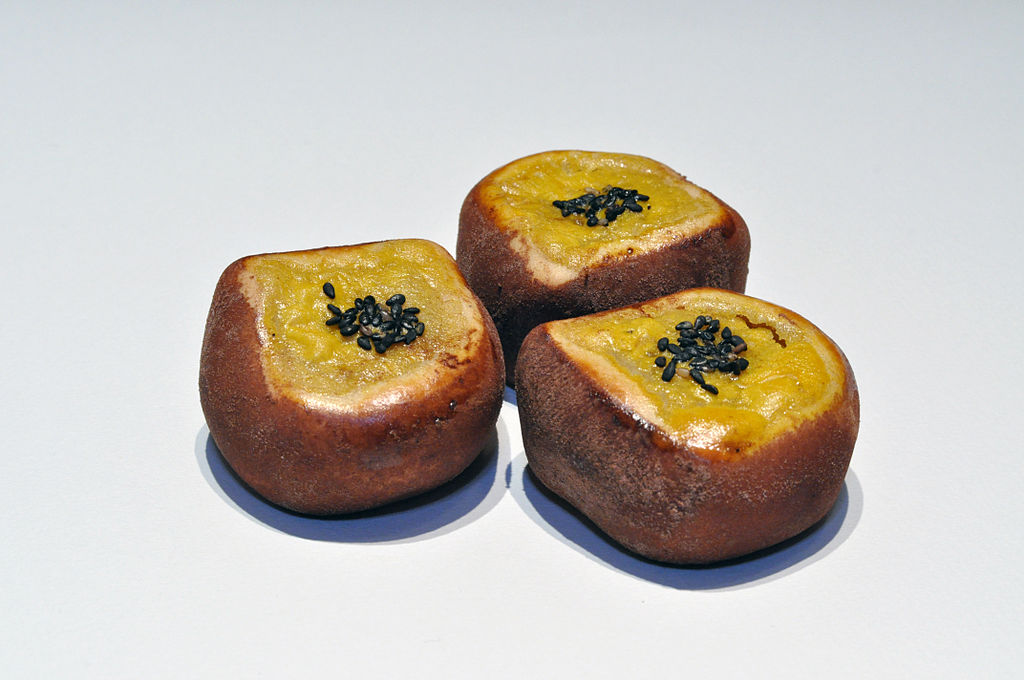
If you’re in the mood for something sweet, visit one of the oldest Japanese-American owned businesses in the country. Fugetsu-Do was opened in 1903 and continues to be family operated to this day. And the quality and consistency is still there in every carefully crafted confection they create. Whether you’re trying their mochi, manju, or any other number of authentic treats, you’re bound to find a new favorite or a familiar flavor you’d nearly forgotten.
Mikawaya: The Birth of Mochi in Little Tokyo Los Angeles
If you’re looking for mouth-watering mochi ice cream, why not go to the source? Mikawaya is more or less where the mochi craze started. Rice dough creates a protective shell around frosty ice cream for a sweet treat perfect for summer afternoons in Little Tokyo Los Angeles. And if you’re already full, you can get some to go.
Chado Tea Room: One Afternoon – 300 Teas
While not exclusive to Little Tokyo Los Angeles, Chado Tea Room has become somewhat of a staple across Los Angeles. And with the emphasis on tea in Japanese culture, it makes sense that Chado’s Little Tokyo location is rather popular. Choose from over 300 blends of exotic tea, along with accompanying finger foods and desserts. Can you think of a better way to round out an afternoon in Little Tokyo?
Max Karaoke Studio: Sing Like Nobody’s Watching
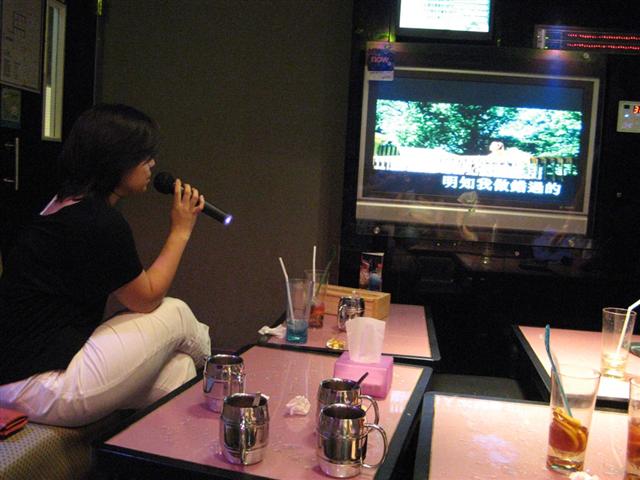
Yet, there’s still a way to round out your night in Little Tokyo. Nestled in the corridors of the Little Tokyo Galleria, you’ll find a karaoke singer’s dream. Max Karaoke Studio allows guests to rent private rooms where state-of-the-art karaoke equipment serves up a selection of over 2,000 songs. Aside from American standards, you’ll also be surprised by the generous bounty of Kpop and Jpop choices. You can even bring your own food and drink into the rooms (for a modest fee).
With a brand that says as much as JohnHart’s, Senior Copywriter Seth Styles never finds himself at a loss for words. Responsible for maintaining the voice of the company, he spends each day drafting marketing materials, blogs, bios, and agent resources that speak from the company’s collective mind and Hart… errr, heart.
Having spent over a decade in creative roles across a variety of industries, Seth brings with him vast experience in SEO practices, digital marketing, and all manner of professional writing with particular strength in blogging, content creation, and brand building. Gratitude, passion, and sincerity remain core tenets of his unwavering work ethic. The landscape of the industry changes daily, paralleling JohnHart’s efforts to {re}define real estate, but Seth works to maintain the company’s consistent message while offering both agents and clients a new echelon of service.
When not preserving the JohnHart essence in stirring copy, Seth puts his efforts into writing and illustrating an ongoing series entitled The Death of Romance. In addition, he adores spending quality time with his girlfriend and Romeo (his long-haired chihuahua mix), watching ‘70s and ‘80s horror movies, and reading (with a particular penchant for Victorian horror novels and authors Yukio Mishima and Bret Easton Ellis). He also occasionally records music as the vocalist and songwriter for his glam rock band, Peppermint Pumpkin.


